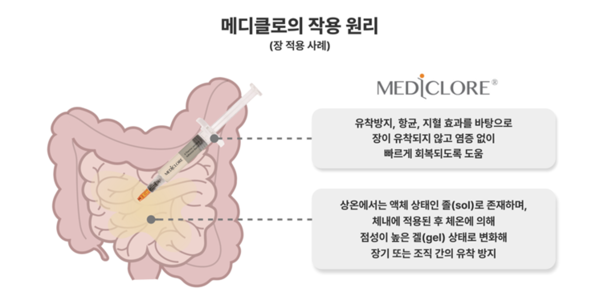CG Bio said Thursday that the company signed contracts totaling 5.6 billion won ($4.3 million) with CarePlusOne of Taiwan and OTIMA of Brazil to export its anti-adhesion drug, Mediclore.

Anti-adhesion agents prevent the adhesion of tissues or organs. After surgery, medical professionals insert it into areas of concern to form a barrier and prevent them from sticking together. It is used in various surgical operations, including spinal, joint, mastectomy, obstetrics, and gynecology.
Mediclore is a liquid solution at room temperature but changes to a highly viscous gel at body temperature, preventing adhesion during wound recovery.
Mediclore also performs a triple function of anti-adhesion, hemostatic, and antibacterial.
The main components of Mediclore are poloxamer, chitosan, and gelatin. Poloxamer forms a physical barrier film through a temperature-changing process to directly prevent the occurrence of tissue adhesion and instead increase the adhesion of the liquid phase to the application site, so this area remains well supported. Chitosan has an antibacterial effect, inhibiting super bacteria and E. coli growth. Gelatin helps to stop bleeding based on the blood cell aggregation effect.
In Taiwan, doctors apply anti-adhesion drugs to various surgical operations, such as spinal fusion, joint and obstetrics, and gynecological surgeries, which total about 90,000 annually. However, only single characteristic products providing anti-adhesion effects are available in Taiwan. Thus, according to CG Bio, Mediclore is expected to preoccupy the main market share due to its superior effects.
Brazil is an emerging anti-adhesion drug market because of surgeries, sports-related injuries, an increasing elderly population, and a growing awareness of adhesive-related diseases. CG Bio plans to actively target orthopedic surgeries so Mediclore can occupy half of the country’s anti-adhesion market in 2025.
"Taiwan and Brazil are two of the most promising markets for growth, and we are pleased to see the entry of Mediclore, a triple effect anti-adhesion drug with excellent technology,” CEO Yu Hyun-seung said, “We will continue to research and develop innovative products based on regenerative medical technology to provide solutions that can contribute to the healthy lives of patients globally.”

